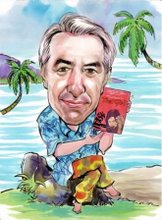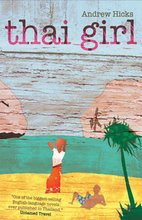


I’ve just bought a full suspension bike at Chong Jom, the Cambodian border market… not new but imported second hand from Japan.
With the current excessive heat, it’s impossible to do anything except sit around and wilt, so getting enough exercise is a real problem. The bike’s a partial solution as most evenings I now head off into tracks through the rice fields for an hour or so and get my heart pumping and, needless to say, work up a sweat.
Yesterday as I was cycling back past some rubber plantations I saw several people in the trees picking things off the ground. I didn’t think too much about it, but shortly afterwards I heard a loud cracking sound from the plantation, followed by something falling through the foliage to the ground. I then noticed that the track was littered with hard seed cases; the dry seed pods were bursting with a loud report and casting their seeds onto the ground.
I stopped and put some in my pocket. Very like castor oil seeds, they’re hard and rather beautiful, a bit like a conker, though much smaller. It’ll be interesting trying to germinate some of them and to see how easy it is to grow the trees.
The rubber tree, hevea braziliensis is a native of Brazil and was introduced to the Far East in 1877 via Kew Gardens and Sri Lanka to the Botanic Gardens in Singapore. Imagine the sense of excitement to be the custodian of those first seeds that were to create a huge rubber industry throughout Malaysia and further afield and that would bring the motor car and, further down the road, condoms.
In colonial Malaya, the production of latex was based on large plantations owned by publicly listed companies and was very big business indeed. The development of the pneumatic tyre soon assured the economic and strategic importance of rubber. Smallholders throughout the region then saw the opportunity and took up rubber cultivation and now it’s even taking off in my own village in the North East of Thailand.
I’d always assumed that the rubber tree needed a wet climate and that this part of Thailand with its long dry season wouldn’t be suitable. It seems that the trees can thrive nonetheless, though the production of latex is less good than further south in the peninsula where it rains all the year round.
With rice cultivation now yielding minimal profits and rubber prices high, local villagers have been planting rubber on marginal land and even on their precious rice fields. I’m not sure how they finance the project as they’ll have to wait about seven years before the trees become productive and during that time there’s a considerable cost keeping the ground clear of undergrowth to allow the trees to thrive.
The previous Thaksin government had a major scheme that offered farmers free saplings, but inevitably this led to distortions, with trees being planted on unsuitable land and massive corruption in the contracts for production of the trees. This may be one of the reasons for all the new rubber you see around here.
The other problem for small farmers is that by the time their trees become productive, the price may have collapsed. When crude oil prices are high, demand for natural rubber increases as synthetic petro-rubber becomes more expensive, as it does when the world economy is booming. Recently however factors have coincided to bring about a fall in the price of latex from US$100 per ton to US$60, a slippage that will have a big impact on small producers who are always at the mercy of international prices. With the Thai currency, the baht very strong, the export price is also hit, so the joys of rubber can be very volatile.
As with rice cultivation, rubber tapping is labour intensive and I can foresee problems as more rubber comes into production. With so many young people migrating to the towns to find work, there’s going to be a big labour shortage in the countryside.
Being a rubber tapper is the pits. In Malaysia, this work’s often done by immigrants from Indonesia, sometimes illegals, who squat in their desperate little bamboo huts built amongst the trees. Tapping, in which a diagonal cut is made in the bark and the sap bleeds into a cup attached to the tree, has to be done very early in the morning when the mosquitos are rampant. It’s unpleasant work, but around here I guess smallholders will often do the tapping themselves. Otherwise the practice is that the owner shares the proceeds of sale of the latex with the tapper on a fifty fifty basis.
The latex is collected in a bucket later in the day and is then rolled out into sheets of a standard size using a machine that looks rather like an old fashioned mangle for drying clothes. As the sheets are unsaleable if they have more than the required water content, they are then spread out to dry in the sun. In the villages round here, you often see them hanging on lines around the farm houses, like an excess of babies’ nappies out to dry.
Rice farming is in crisis here, especially with this year’s rainy season drought, and more and more alternative cash cops are now being grown. Within a hundred yards of our house there’s rubber, sugar cane and eucalyptus for scaffolding poles and paper production. All of these make the land barren, so there’ll be negative long term consequences arising from all these changes in agricultural practice.
In the new market by the bus station in Sangkha, they’ve built a new factory for making brassieres and underware. It’s labour intensive work and employs large numbers of ladies, bringing money into the local economy and offering modest wages for women who otherwise would have to migrate away to feed their families.
Thailand has a massive problem of urban drift and Bangkok is growing at a crazy rate, an urban nightmare writ large. Massive mega-projects are needed to improve the transport infrastructure, but if a tiny fraction of this investment could be spent providing incentives for industry to move upcountry, the problem at both ends could be reduced. Maintaining rural communities with new job opportunities would take the pressure off the cities.
Having said that, it’s never an easy goal to achieve. Huge sums of public money can be thrown at regional development and still be unsuccessful in establishing new industries. Nonetheless, towns like Surin are growing and are ready to take on new opportunities. With the divide between urban and rural society growing so fast, this must be one of Thailand’s biggest problems that simply cannot be ignored.





No comments:
Post a Comment